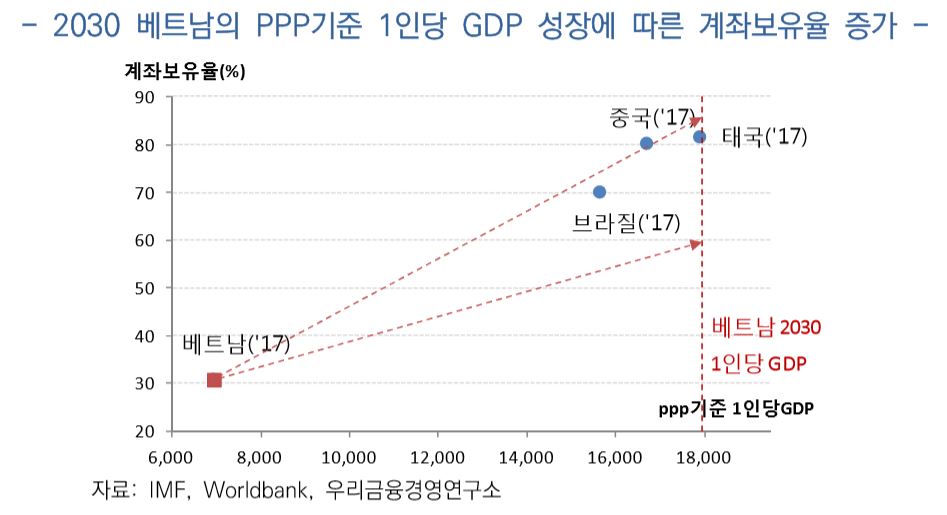
중국으로부터의 생산기지 이전이 가속화되는 베트남 2030년 포스트차이나로 성장하며 금융시장도 확대될 전망이다.
25일 우리금융그룹 우리금융경영연구소에 따르면 중국으로부터 생산기지 이전이 가속화되고 있는 베트남의 경제와 금융시장 발전 수준이 2030년에는 현재의 중국과 유사한 정도로 성장할 것으로 추정했다. 2030년 베트남의 PPP(구매력 평가) 기준 1인당 GDP 규모는 2018년 중국의 규모와 유사한 17,988달러를 기록할 것으로 예상된다.
2017년 기준 2,881억 달러에 불과한 베트남의 민간신용 규모도 2030년까지 1.1조 달러로 확대될 전망이다. 현재 GDP대비 130.7%인 민간신용 규모가 2018년 중국의 GDP대비 민간신용 규모 (157.4%) 수준으로 확대될 것으로 가정했을 때 전망치다.

중국을 대체할 생산기지로 부상하며 포스트차이나로 주목받고 있는 베트남은 생산기지화 진전에 의한 수출 및 FDI 유입 증가가 경제성장을 견인할 전망이다. 생산기지로서 베트남의 가장 큰 경쟁력은 낮은 임금의 풍부한 청년층 노동인구, 중국과 인접한 지리적 이점, 동남아 FTA 허브국의 위상 등이 꼽히고 있다.
IMF는 베트남이 포함된 CLMV(Cambodia, Laos, Myanmar, Vietnam)등 저소득 아시아 국가가 노동집약적 산업에서 경쟁력이 낮아지고 있는 중국을 대체하고 있으며, 특히 베트남은 전자산업 분야에서 중국과 경쟁할 수 있는 수준까지 성장한 것으로 평가한다고 분석했다.
베트남이 생산기지로서 부상함에 따른 수출과 FDI(외국인직접투자) 증가가 경제성장을 견인할 전망이다. HSBC는 베트남의 수출규모가 연평균 10%씩 증가하여 2030년에는 아세안 국가 중 최대 수출대국으로 성장할 것으로 예상했다. 2030년 베트남 수출 예상규모는 7,500억 달러로 2017년 현재 전 세계 수출 4위인 일본의 수출규모 6,981억 달러를 상회하는 수준이다.
생산기지 이전이 가속화됨에 따라 제조업 중심의 FDI 유입이 증가하고, 베트남 수출 의 71.6%를 차지하고 있는 외투 기업의 수출도 증가할 것으로 예상된다.
베트남은 경제 성장과 함께 예상되는 ▲소득 증대에 따른 소비패턴 변화 ▲부동산 등 내수시장 확대 ▲정부의 금융시스템 개선도 금융시장 확대를 가속화시키는 요인으로 작용할 것으로 보인다.
우선 소득 증가로 중산층 인구가 증가하고 삶의 질 향상을 추구하는 방향으로 소비패턴이 변화하면서 결제, 자산관리 등 금융수요가 다변화될 것으로 예상된다. 또한 1억 명을 넘어설 것으로 예상되는 베트남의 인구규모와 도시화의 진전 등의 요소는 내수시장 확대와 함께 부동산 시장의 안정적 성장은 대출 등 금융 니즈 확대 요인으로 작용할 것으로 보인다. 아울러 정부의 금융시스템 개선] 정부가 낙후된 금융시스템과 인프라 개선을 주도함에 따라 금융시스템의 신뢰도가 제고되어 금융시장 발달을 뒷받침할 전망이다.

최근까지 베트남은 소득수준이 낮아 계좌보유 니즈가 적을 뿐만 아니라 제도권 금융에 대한 신뢰도가 낮아 계좌보유율도 30.8%로 미미한 상태다. 이에 따라 베트남의 계좌보유율도 2030년에는 현재 대비 최소 두 배 이상 증가할 여지가 있다는 분석이다.
우리금융연구소 관계자는 "국내 금융회사들은 현재 베트남의 성장잠재력을 기회요인으로 삼아 진출을 확대하고 있으나, 현지화를 통해 더욱 적극적인 영업 확대 전략을 추진할 필요가 있다"라며 "특히 베트남 정부의 현금없는 사회로의 전환 추진 등 디지털 금융이 리테일 금융시 장의 성장을 견인할 것으로 예상된다"고 말했다.

[Analysis] Vietnam's emerging 'financial market' as a 'post-China'
The country's financial market is also expected to expand as it grows into post-China in 2030, when the relocation of production bases from China is accelerating.
According to Woori Financial Group's Woori Finance Research Institute on Saturday, it estimated that Vietnam's economic and financial market development level, which is accelerating the relocation of production bases from China, will grow to a similar level to that of the current China in 2030. Based on Vietnam's PPP (Purchase Power Assessment) in 2030, the per capita GDP is expected to reach $17,988 in 2018, similar to that of China.
Vietnam's private credit volume, which stood at $288.1 billion as of 2017, is also expected to expand to $1.1 trillion by 2030. The forecast is based on the assumption that the size of private credit, which currently stands at 130.7 percent of GDP, will expand to 157.4 percent of China's GDP in 2018.
Vietnam, which has emerged as a production base to replace China and is drawing attention as a post-China country, is expected to fuel economic growth due to increased exports and FDI inflows due to the development of production base. Vietnam's biggest competitiveness as a production base is cited as a rich youth labor force with low wages, geographical advantages adjacent to China and the status of a Southeast Asian FTA hub country.
The IMF analyzed that low-income Asian countries, including Vietnam (Combodia, Laos, Myanmar and Vietnam), are replacing China, which is becoming less competitive in labor-intensive industries, and Vietnam in particular has grown to the point where it can compete with China in the electronics industry.
With Vietnam emerging as a production base, growing exports and FDI (foreign direct investment) are expected to drive economic growth. HSBC expected Vietnam's exports to grow by 10 percent annually to become the largest export destination among ASEAN countries in 2030. The estimated export volume to Vietnam in 2030 was $750 billion, which is above $698.1 billion for Japan, the world's fourth-largest export as of 2017.
As the relocation of production bases accelerates, the inflow of manufacturing-oriented FDI is expected to increase, while exports of overcoat companies, which account for 71.6 percent of Vietnam's exports, are expected to increase.
The change in consumption pattern due to the expected increase in income in Vietnam along with economic growth, and the expansion of domestic markets such as real estate and the improvement of the government's financial system are also expected to accelerate the expansion of financial markets.
First of all, financial demand such as payments and asset management is expected to diversify as income increases increase the middle class population and consumption patterns change in the direction of seeking to improve the quality of life. Also, factors such as Vietnam's population size and progress in urbanization, which are expected to exceed 100 million, are expected to serve as factors for expanding financial needs, including loans, along with the expansion of the domestic market. In addition, the government's initiative to improve the financial system and infrastructure is expected to enhance the credibility of the financial system to support the development of financial markets.
Until recently, Vietnam had a meager 30.8 percent account holding rate due to low income levels as well as low need to keep accounts and low confidence in the system's financing. As a result, Vietnam's account holding rate could at least double the current level in 2030.
"Although domestic financial companies are currently expanding their presence by using Vietnam's growth potential as an opportunity factor, they need to pursue strategies to expand their operations more aggressively through localization," said an official at Woori Finance Research Institute. "In particular, digital financing, such as the Vietnamese government's push to shift to a cashless society, is expected to drive growth in retail financial markets."


